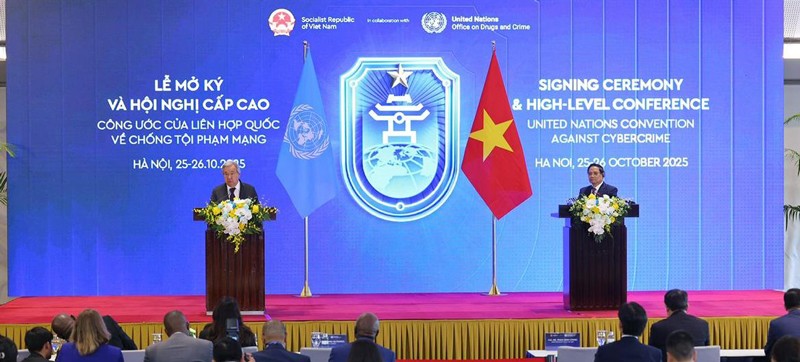Just Earth News | @justearthnews | 25 Oct 2025, 07:20 am Print
 Cyber Security
Cyber Security Secretary-General António Guterres (left) and Prime Minister Pham Minh Chinh of Viet Nam at the joint press conference. Photo:UN in Viet Nam
Sixty-five nations have signed a landmark United Nations treaty in Hanoi aimed at tackling cybercrime – a move Secretary-General António Guterres hailed as a historic step toward a safer digital world.
Adopted by the General Assembly in December 2024 after five years of negotiation, the Convention against Cybercrime establishes the first universal framework for investigating and prosecuting offences committed online – from ransomware and financial fraud to the non-consensual sharing of intimate images.
“The UN Cybercrime Convention is a powerful, legally binding instrument to strengthen our collective defences against cybercrime,” said Guterres at the signing ceremony on Saturday.
“It is a testament to the continued power of multilateralism to deliver solutions. And it is a vow that no country, no matter their level of development, will be left defenceless against cybercrime.”
The signing ceremony was hosted by Viet Nam in collaboration with the UN Office on Drugs and Crime (UNODC), drawing senior officials, diplomats and experts from across regions.
A global framework for cooperation
The new treaty criminalises a range of cyber-dependent and cyber-enabled offences, facilitates the sharing of electronic evidence across borders and establishes a 24/7 cooperation network among States.
It also makes history as the first international treaty to recognise the non-consensual dissemination of intimate images as an offence – a significant victory for victims of online abuse.
It will enter into force 90 days after the 40th State deposits its ratification.
A collective defence for the digital age
In his remarks, Guterres warned that while technology has brought “extraordinary progress,” it has also created new vulnerabilities.
“Every day, sophisticated scams defraud families, steal livelihoods and drain billions of dollars from our economies,” he said. “In cyberspace, nobody is safe until everybody is safe. One vulnerability anywhere can expose people and institutions everywhere.”
The Secretary-General emphasised the Convention represents “a victory for victims of online abuse” and “a clear pathway for investigators and prosecutors” to overcome barriers to justice when crimes and evidence cross multiple borders.
By providing a global standard for electronic evidence, the treaty aims to improve cooperation between law enforcement agencies while safeguarding privacy, dignity and fundamental human rights.
UN chief’s visit to Viet Nam
The signing ceremony formed part of Guterres’ official visit to Viet Nam, where he also met with President Lương Cường, Prime Minister Pham Minh Chinh and other top officials.
At a joint press conference with the Prime Minister, Guterres highlighted Viet Nam’s vital role in the global digital supply chain.
“It is fitting that [the signing ceremony] takes place here – in a nation that has embraced technology, powered innovation and become an essential part of the world’s digital supply chains,” he said, urging States to swiftly ratify and implement the treaty.
“Now we must turn signatures into action,” he said. “The Convention must be ratified quickly, implemented fully, and supported with funding, training and technology – especially for developing countries.”
A safer cyberspace for all
The new convention is expected to reshape how countries tackle cybercrime at a time when digital threats are rising sharply. Global cybercrime costs are projected to reach $10.5 trillion annually by 2025, according to industry experts.
For many governments, particularly in the Global South, the treaty represents an opportunity to access training, technical assistance and real-time cooperation channels.
“Let us seize this moment,” Guterres said. “Let us build a cyberspace that respects everyone’s dignity and human rights – and ensure that the digital age delivers peace, security and prosperity for all.”
- YouTube Premium Lite just got a massive boost — Know all details
- Trump claims he stopped 35 million deaths by stopping India-Pakistan war
- Entrepreneur decides to shut down 16-year old eatery in London, cites harassment and Pakistani attacks
- Ubisoft bets big on Assassin’s Creed with strategic leadership revamp
- US: Abducted Sikh man found dead close to Lake Berryessa





-1763561110.jpg)
